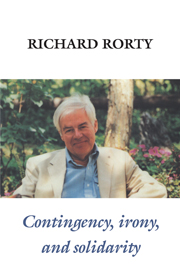8 - The last intellectual in Europe: Orwell on cruelty
Published online by Cambridge University Press: 05 June 2012
Summary
Orwell's last two novels are good examples of what Nabokov thought of as “topical trash,” for their importance is a result of having made a big practical difference. We would not now be reading and admiring Orwell's essays, studying his biography, or trying to integrate his vocabulary of moral deliberation into our own unless he had written Animal Farm and 1984. Lolita and Pale Fire will survive as long as there are gifted, obsessive readers who identify themselves with Humbert and Kinbote. But even Irving Howe, who wrote one of the earliest and best discussions of 1984, admits that Orwell is one of those writers “who live most significantly for their own age.”
Orwell's best novels will be widely read only as long as we describe the politics of the twentieth century as Orwell did. How long that will be will depend on the contingencies of our political future: on what sort of people will be looking back on us, on how events in the next century will reflect back on ours, on how people will decide to describe the Bolshevik Revolution, the Cold War, the brief American hegemony, and the role of countries like Brazil and China. Orwell thought of our century as the period in which “human equality became technically possible” and in which, simultaneously,
… practices which had long been abandoned, in some cases for hundreds of years – imprisonment without trial, the use of war prisoners as slaves, public executions, torture to extract confessions, the use of hostages, and the deportation of whole populations – not only became common again, but were tolerated and even defended by people who considered themselves enlightened and progressive.
- Type
- Chapter
- Information
- Contingency, Irony, and Solidarity , pp. 169 - 188Publisher: Cambridge University PressPrint publication year: 1989
- 5
- Cited by



